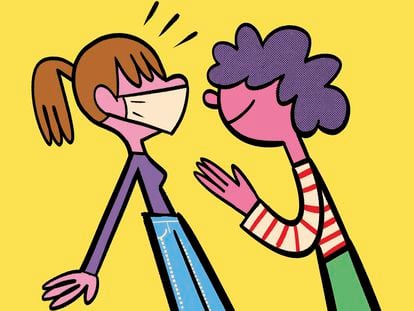Five lessons from a virus named SARS-CoV-2
The end of the pandemic probably won’t make headlines. By then, we will have gone so long without masks, quarantine, isolation and lockdowns that it probably won’t seem like big news. But there are things we should remember for next time
/cloudfront-eu-central-1.images.arcpublishing.com/prisa/RXLXILN6IBAO7BGYIYQYONR7N4.jpg)

Beware of any respiratory virus
At the end of December 2019, when China raised the first alarm and officially recognized that it was detecting pneumonia cases of unknown origin in the province of Hubei, emergency systems around the world took note but remained calm. There was no panic: they receive alerts on a daily basis, and more often than not they turn out to be nothing to worry about. On January 7, 2020, the pathogen causing the pneumonia cases was sequenced. It was a new coronavirus that was named 2019-nCoV (2019 novel coronavirus) and ended up being called SARS-CoV-2 because of its similarity to the virus that causes severe acute respiratory syndrome (SARS).
At that point the new virus was still not causing much concern as it was thought that it was not capable of human-to-human transmission. It is easy to spot mistakes in hindsight, but if the experience has taught the scientific community anything, it is that coronaviruses should always be taken seriously. By the time its capacity for transmission was confirmed, it was too late; it had already begun to spread across the world to cause successive pandemic waves over the course of two years.

Lockdowns don’t just happen in China
Faced with the most extensive lockdown in history in the city of Wuhan, home to 11 million, many analysts were quick to state that similar action was unthinkable in a democracy. If the Chinese locked people in their homes, it was because they lived under a totalitarian regime that controlled their every move. Less than two months later, those same analysts were having to work from home.
One third of humanity was locked up in the spring of 2020. Spain, which had been slow to react, opted for one of the strictest lockdowns in the West: for a month and a half, even going for a walk was off the agenda. Very little was still known about this microscopic bug that has so far claimed more than six million lives worldwide, according to official figures. The medical journal The Lancet triples that figure, putting Covid-19 deaths at 18 million.

Trust and, above all, invest in science
The language of war has been common during the pandemic, although the difference between the fight against Covid-19 and a real war has been highlighted by the conflict in Ukraine. The main difference is that, except for a few “creative” individuals who denied the existence of Covid-19 entirely, the world fought the virus together. It was humanity versus the coronavirus.
From the start, it was clear that if anything could come to our rescue, it was science. Within weeks, there were vaccine prototypes and, in less than a year, the first safe and effective vaccines were ready. Although they became less effective in preventing transmission as the virus mutated, and protection against illness decreased with time, they proved to be a very valuable weapon in drastically reducing the chances of ending up in a hospital.

Don’t declare premature victory
After the first wave, few imagined that many more would come our way. “We have beaten the virus,” declared the prime minister of Spain, Pedro Sánchez, in June 2020. By then, some 27,000 people in Spain had officially died of the disease. Since that statement, at least 75,000 more have died, according to data from the Ministry of Health.
The feeling that the pandemic must be over has been recurrent in many countries. Time will tell if we have, once again, been too hasty in claiming victory.

Pandemics march to the beat of their own drum
The measures that humans have used to curb the virus include lockdowns, masks, venue capacity reduction, hand sanitizer, curfews and travel restrictions. It has become clear that such measures can go some way towards reducing Covid’s impact. But they are by no means a cure-all – an assumption that could have been made until this year, based on the fact that many Asian countries managed to reduce the number of infections to insignificant figures thanks to a zero-tolerance strategy, consisting broadly of closing their borders and rigorously isolating each infected person and their contacts.
But the omicron variant is highly resistant to strategies. Cases in China and Korea are soaring and they now fear death rates similar to those experienced by the West during other waves. Even if vaccines reduce mortality, the rise in infections is so rapid that hospitals are at risk of collapse.
A pandemic does not end until it ceases to be a global problem. And that moment has not yet arrived. When it does, almost no one will care.


/cloudfront-eu-central-1.images.arcpublishing.com/prisa/XECGZ2O4ANHYZEQJUX4OKQ6VWQ.jpg)










































